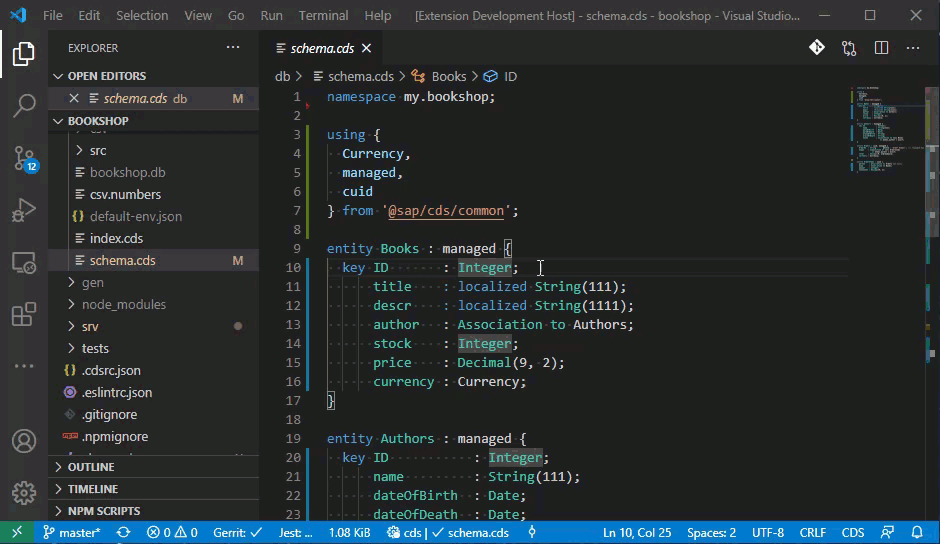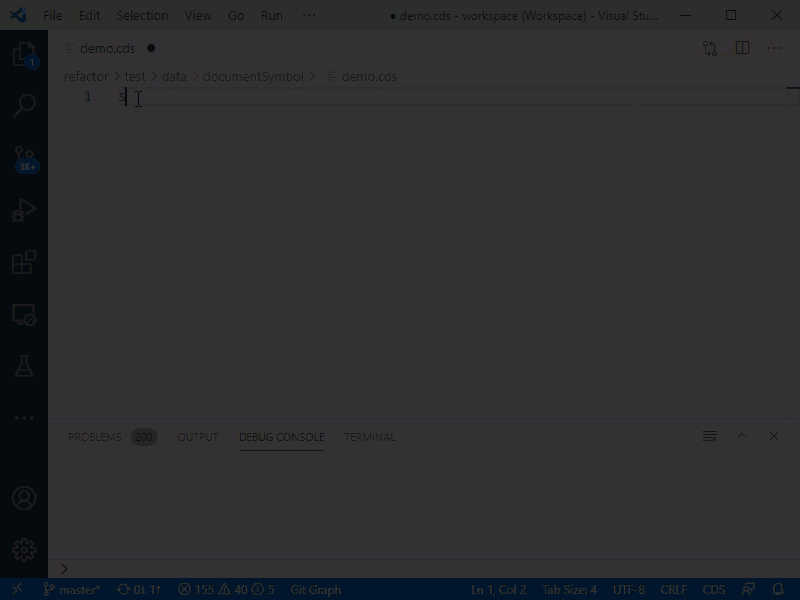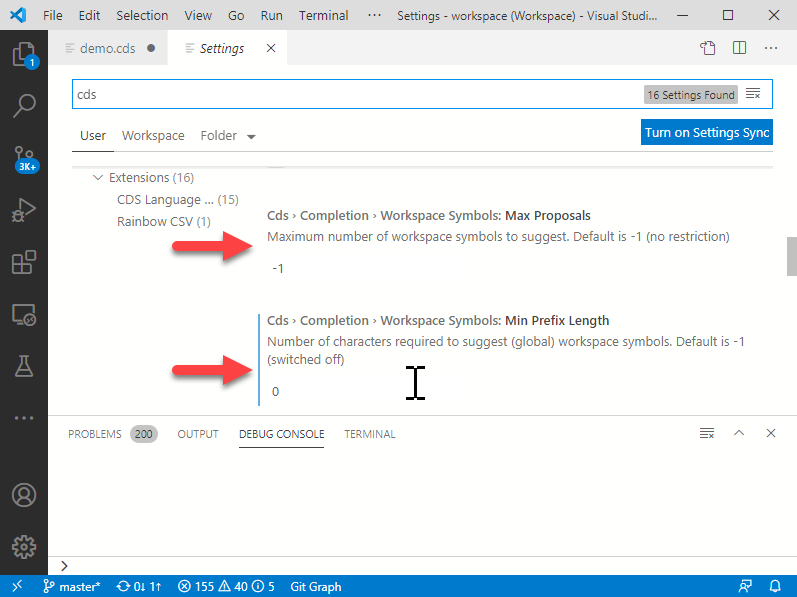August 2020





New and Revised Guides
CDS Editors & Tools
The following features are available for all editors based on our language server implementation for CDS in SAP Business Application Studio, Visual Studio Code, and Eclipse. The plugins are available for download for Visual Studio Code at Visual Studio Marketplace and for Eclipse at https://tools.hana.ondemand.com.
Preview Commands (currently not in Eclipse)
The VS Code extension for the core data services (CDS) language now features a set of commands to generate a quick preview for a given cds file. By using this preview, you can get a quick glance at the code the cds compiler will generate.

Code Completion Proposes Global Identifiers
The editor includes proposals of identifiers found in the workspace that aren't yet imported in the current file. 
Enable global proposals: 
CDS Language & Compiler
Join Cardinality
CQL now allows to specify a join cardinality. Allowed are any combinations of { [ EXACT ] ONE | MANY } TO { [ EXACT ] ONE | MANY } for { INNER | { LEFT | RIGHT | FULL } [ OUTER ] } joins. The cardinality is added in for SAP HANA generated CREATE VIEW statements.
Unique Constraints
Support the creation of unique constraints by assigning @assert.unique.<constraintName> to non-query entities or query entities annotated with @cds.persistence.table. The value of the annotation is an array of paths referring to elements in the entity. The path leaf may be an element of a scalar, structured or managed association type. Individual foreign keys or unmanaged associations can't be accessed. In case the path points to a structured element, the unique constraint will contain all columns stemming from the structured type. In case the path points to a managed association, the unique constraint will contain all foreign key columns stemming from this managed association.
Extended Projection Support
Projections columns can now use expressions like select items, both for entity … as projection on and extend projection … with.
OData V4: array of <structured>
array of <structure> or many <structure> is now allowed in OData V4, flat format.
Foreign Key Access and Association to Join Translation
The association to join transformation treats foreign key accesses with priority. If a foreign key of a managed association can be accessed without joins, no joins are generated. The priority handling can be turned of with option joinfk.
Before:
CREATE VIEW V AS SELECT
managedAssociation_1.foreignKey
FROM (Source AS Source_0 LEFT JOIN Source AS managedAssociation_1 ON (Source_0.managedAssociation_foreignKey = managedAssociation_1.foreignKey));After:
CREATE VIEW V AS SELECT
Source_0.managedAssociation_foreignKey AS foreignKey
FROM Source AS Source_0;Extended Event Support
An event payload type can now be defined with a type/entity reference or a projection (instead of providing the elements directly). Furthermore, aspects can now be included when specifying the elements of an event payload type, as it's known for type, entity and aspect definitions. The directly provided elements of an event payload are now represented as elements in the CSN.
Node.js Runtime
Setting Headers for Remote Services
Headers can be set with tx.emit on remote HTTP services:
const tx = service.transaction()
const resultUsingHeaders = await tx.emit({
query: SELECT.from('Entity'),
headers: { header1: 'content'}
})See Node.js > Core Service API for more details.
Support for Privileged Users
With cds.User.Privileged, it's possible to bypass authorization checks while consuming a local service. See Node.js > Authentication for more details.
Miscellaneous
- Support for
@sap/xssec^3 - Support for
expandwith*in Query Language API
Java Runtime
Important Changes ❗️
UPSERT event isn't used anymore!
Previously, OData V4 PUT requests triggered an UPSERT event on the corresponding CAP services. By default, the UPSERT event implements a CqnUpsert statement, which first triggers a cascading delete followed by a deep insert. This doesn't exactly match the semantics of a PUT.
Now, the OData V4 PUT follows the same pattern as PATCH, by:
- First triggering an
UPDATEevent - Following a
CREATEevent if the entity didn't yet exist.
As the UPDATE event in CAP supports updating sparse data, the PUT operation also ensures to fill up unspecified values with null or their default values, as long as they can't be determined through a foreign key relation. In addition, a PUT request no longer affects the full composition tree of an entity, but only those parts of the entity that the PUT was sent to and those that are specified in the entity data.
Action required: If your application has been using PUT requests and therefore registering event handlers for UPSERT, you need to register event handlers for CREATE and UPDATE events instead! Note however, that an UPSERT event can still be triggered through the local service consumption API.
System User
- The name of the XSUAA system user (JWT with client credential flow) is now set to
system.
SAP Fiori Drafts
You can now use OData V4 PATCH and PUT requests to update and create active entities by specifying the key property IsActiveEntity=true in your OData URI. This skips the need to create an inactive draft entity first, which is useful when updating or creating an entity through technical APIs instead of SAP Fiori UIs. See Java > Bypassing Fiori Draft Flow for more details.
SaaS Multitenancy
It's now possible to develop multitenant CAP Java applications with MTX Sidecar and Service Manager, see Java > Multitenancy.
OData V4
The OData V4 protocol adapter now additionally supports applying a compute transformation on the result of the groupby or aggregate transformations of $apply. Note: navigation properties aren't supported when using compute.
Privileged User
A new option privilegedUser() can be leveraged when defining your own RequestContext. Adding this introduces a user, which passes all authorization restrictions. This is useful for scenarios, where a restricted service should be called through the local service consumption API either in a request thread regardless of the original user's authorizations or in a background thread.
Remote OData V2 / V4 Service Consumption (alpha)
CAP's service consumption APIs are based on the protocol-agnostic CQN query language. So far, The CAP Java runtime only supported to run CQN queries against SQL databases out-of-the-box. By adding the newly introduced Maven dependency cds-feature-remote-odata to your CAP Java project, you can now enable CQN queries against remote OData V2 and V4 services. SAP Cloud SDK is used to execute the OData requests, which are compiled from the CQN query definition. In the current state only CqnSelect queries (GET requests) are supported.
You can enable a CDS service from your model as a local representation of a remote OData service, by simply adding a destination configuration to it:
cds:
services:
- name: API_BUSINESS_PARTNER # name of the service in the CDS model
destination:
name: "s4-business-partner-api" # the destination, retrieved from SAP Cloud SDKs DestinationAccessor
suffix: "/sap/opu/odata/sap" # an optional suffix appended to the destination's URL
type: "odata-v2" # or odata-v4You can learn more about destinations in the SAP Cloud SDK documentation.
Afterwards, you can interact with the service like with any other database-backend service. See Service Consumption API documentation for more details.
Reflection API
- Support parsing the query definition of views with joins
CDS Data Store
- Support select from subquery. Note: expand isn't supported in subqueries
Bug Fixes
- The
cds-maven-plugindoesn't use npm/npx from local installation cache anymore, if goalinstall-nodeis skipped or not configured. In this case, a globally installed npm/npx is required and used. - Fixed a bug that caused a
NullPointerExceptionwhen calling an action or function, which returned a contained entity. With this fix, the OData V4 context URL for actions or functions returning an entity is now built based on entity types instead of entity sets. - Fixed a bug that caused the
cds-maven-pluginto determine a null working directory, in case the Maven project used an "external" parent project, not part of it's own source tree. - Fixed a bug that caused an incorrect encoding of non-ASCII characters in
sap-messagesheader - Generate builder interfaces for services containing only actions/functions
- Fixed typed data access for arrayed types